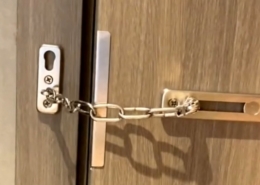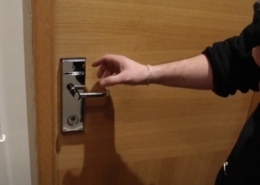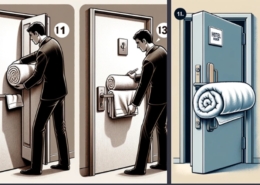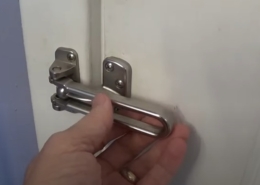What Are The Types of Keys in Hotel and Key Control in Hotels?
Discover the various types of keys in hotels and the importance of effective key control in hotels. Learn how hotels manage and secure keys to ensure the safety and convenience of guests.
When operating a hotel efficiently, key management and control are paramount. In this article, we will delve into the world of hotel keys, exploring the different types available and understanding the significance of effective key control.
What is key in the hotel?
A hotel key is a device, typically a card or a key, used to access a specific room or suite in a hotel. It is typically provided by the hotel staff at the front desk when a guest checks in.
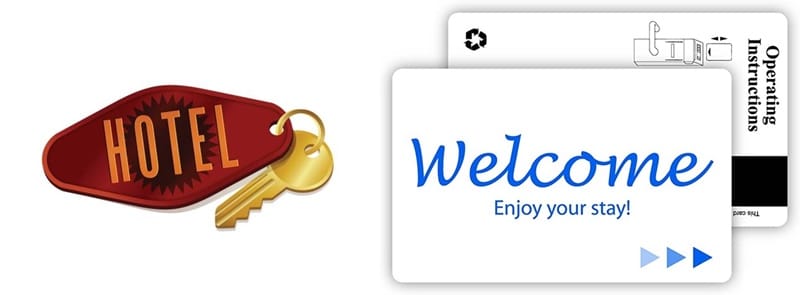
Traditionally, hotel keys were actual physical keys, but most modern hotels now use electronic hotel card keys. These card keys are encoded with a unique signature corresponding to the electronic door lock system on a hotel room’s door. Once the guest checks out, the card is typically reprogrammed for the next guest.
What is a key control in hotels?
Key control in hotels refers to the procedures and policies to manage and track the use, distribution, storage, and return of keys. This includes both guest keys and staff keys. The main goal of key control is to ensure the security and privacy of guests, their belongings, hotel facilities, and assets.
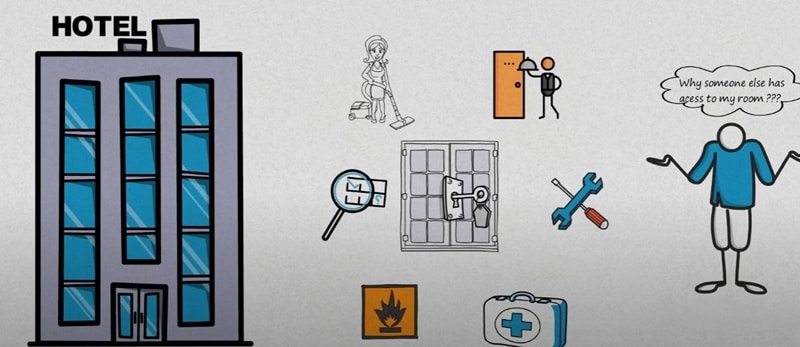
By implementing and maintaining strong key control procedures, hotels can reduce the risk of theft, unauthorized access, and other security incidents. They can also improve guest satisfaction by ensuring the privacy and security of guest rooms.
What is a key control in housekeeping?
Key control in housekeeping refers to the policies and procedures established to manage and monitor the distribution, use, and storage of keys within the housekeeping department of a hotel. This is critical for maintaining security, privacy, and efficient hotel operation.
Housekeeping staff generally require access to guest rooms for cleaning and maintenance and certain restricted areas like laundry rooms and storage areas for cleaning supplies. They usually have master keys or sub-master keys, which can open multiple rooms or sections of the hotel.
Proper key control in housekeeping is essential to ensure the security of guest rooms and hotel property, maintain guest privacy, and ensure efficient and effective housekeeping operations.
What are the Different Types of Keys in Hotels that are used?
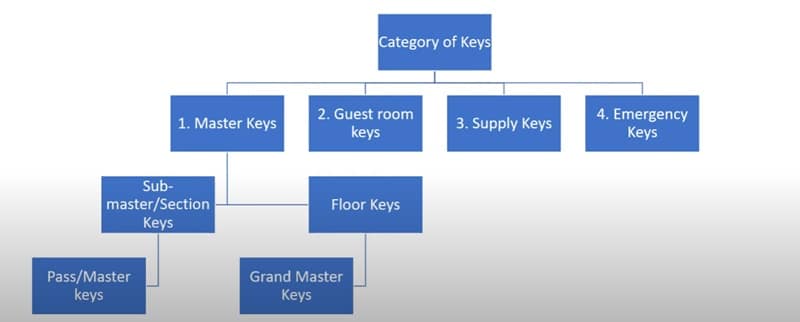
Sure, let’s go into more detail about the different types of keys in a hotel and what they can do:
- Guest Room Key in Hotel: This key is specific to a guest’s room and is given to the guest upon check-in. Depending on the hotel’s technology, it can be a traditional mechanical key, magnetic stripe key, smart card, RFID key card, mobile key, or even a biometric key. Only the specific guest room door can be opened with this key.
- Master Key in Hotel: This key is held by hotel staff and can open multiple (or all) doors in a hotel. It’s typically used by management, maintenance, or housekeeping staff to access rooms for cleaning, repairs, or in case of an emergency.
- Grand Master Keys in Hotel: A grand master key, on the other hand, can open all the doors in the hotel. These keys are usually held by senior hotel staff or management. For more information about hotel master keys, please check this article: Understanding the Role and Importance of Master Key in Hotels.
- Floor Supervisor Key in Hotel: A floor supervisor or housekeeping supervisor often holds this key. It typically opens all rooms on a specific floor or area, allowing the supervisor to check rooms or oversee cleaning and maintenance.
- Emergency Key in Hotel: Similar to a master key, an emergency key can open all rooms and is typically used when quick access to all rooms is required, such as a fire or other emergency. This key is usually held by the hotel’s security team or management. The advantage is the quick access it provides in emergencies.
- Card Keys in Hotel: These are keys in the form of a plastic card with a magnetic stripe, smart chip, or RFID technology. They’re easy to carry and use but can be lost or demagnetized. They can be programmed to open specific rooms (like a guest room key) or multiple rooms (like a master key), depending on who they’re issued to.
- Supply Keys in Hotel: These are typically used by hotel staff to access supply rooms or other areas where hotel supplies are stored. These could be food and beverage storerooms, housekeeping supply rooms, etc. Like other keys, they could be traditional mechanical or more modern card keys, depending on the hotel’s systems.
Each type of key in a hotel has its specific use and is carefully controlled to ensure the security of guests and their belongings. It’s also worth noting that more modern key systems can include additional security features, such as time-limited access or audit trails that show who has accessed which doors at what times.
Importance of key control in hotels

Key control is an integral part of the security procedures in a hotel. It plays a crucial role in ensuring the safety and privacy of guests as well as the protection of hotel property and assets. Here are some reasons why key control is important:
- Guest Safety and Privacy: Guest room keys are the primary means of ensuring guest safety and privacy in a hotel. Effective key control procedures ensure that only authorized individuals (the guest and certain hotel staff) can access a particular room.
- Property Protection: The hotel has many areas that need to be secured, such as storerooms, offices, and other facilities. Proper key control ensures that only authorized personnel have access to these areas, thereby preventing theft or misuse of property.
- Emergency Response: In emergencies, such as a fire or a medical situation, the hotel staff must have immediate access to all rooms. Master and emergency keys, part of key control procedures, enable staff to enter any room quickly if required.
- Loss Prevention: Keys are easy to misplace or lose. A robust key control system helps track the issuance and return of keys, reducing the likelihood of lost keys. In the event of lost keys, proper key control procedures help take swift action, such as deactivating electronic keys or changing locks if needed.
- Accountability: Key control procedures, particularly electronic keys, can provide an audit trail showing when each door was accessed and by whom. This can be useful in investigating incidents, resolving disputes, and ensuring staff accountability.
- Guest Satisfaction: Proper key control contributes to smooth operations, improving guest satisfaction. Knowing that the hotel has effective key control procedures can also give guests peace of mind about their security and privacy.
In summary, key control is a fundamental aspect of hotel operations, contributing to the hotel’s overall security, smooth functioning, and reputation.
Key handling procedure in hotel
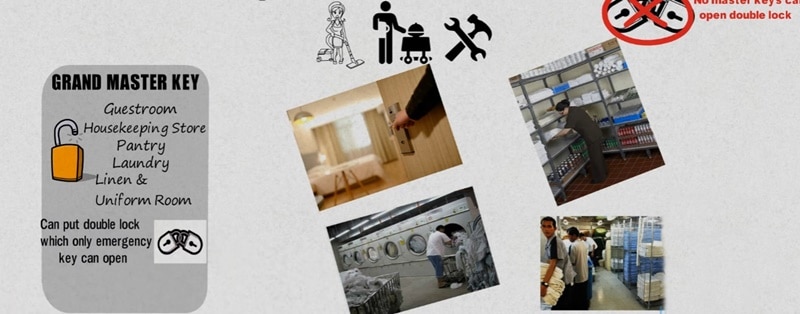
Hotel key handling procedures are designed to ensure the security of guest rooms and hotel facilities. While the specific procedures can vary between different hotels or hotel chains, here’s a general guideline of key handling procedures:
- Key Issuance: When guests check in, a key (or keys) should be issued for their room. The front desk staff usually manages this process. In the case of electronic keys, the key should be programmed to open only the guest’s room and active only for the duration of the guest’s stay.
- Key Explanation: Guests should be given clear instructions about using key cards in the hotel, especially electronic ones. This might include instructions on swiping, inserting a card key, or using a mobile key with their smartphone.
- Key Tracking: Each key or card is tracked, often with a unique identifier. For electronic key systems, this can include tracking which keys were used to open which doors at what times.
- Key Return: Guests should be instructed to return their keys at the end of their stay. For physical keys, this is to prevent loss or theft. It’s more of a courtesy for electronic keys, which can be deactivated electronically after check-out.
- Lost Keys: There should be a procedure in place for lost keys. Typically, this involves issuing a new key to the guest and deactivating the lost key (if electronic). If a physical key is lost, the lock may need to be changed for security reasons.
- Key Storage: When not used, keys should be stored securely to prevent unauthorized access. This is particularly important for master and emergency keys.
- Master and Emergency Key Control: These keys should be strictly controlled and only given to authorized staff. They should be stored securely when not in use. Staff should be trained on when and how to use these keys, and there should be clear procedures for what to do if these keys are lost or stolen.
- Key Auditing: It’s often possible to audit key usage for electronic key systems. This means you can check which keys were used to open which doors at what times. This can be useful for investigating incidents or for general security audits.
- Key Cleaning and Maintenance: Keys and locks should be kept clean and in good working order. Card keys can be wiped clean and should be replaced if they become worn or damaged. Locks should be checked regularly to ensure they are working correctly.
- Privacy: Staff should respect guests’ privacy when using master or emergency keys. They should only enter guest rooms when necessary and should always knock and announce themselves before entering.
- Staff Training: Staff are trained on key control procedures, including the importance of key control for guest privacy and security, how to issue and collect keys, and what to do if a key is lost or stolen.
- Audits and Inspections: Regular audits and inspections are carried out to ensure key control procedures are followed. This can include reviewing audit trails of key use for electronic key systems.
Remember, these are general procedures and may vary depending on the hotel’s specific policies and technologies. Always follow the specific procedures laid out by your hotel or hotel chain.
How to control different Types of Keys in a Hotel?

Effective key control is essential for hotel operations, and each type of key in a hotel may require different control measures. Here’s a general approach to how to control different types of keys:
- Guest Room Keys: These keys are issued to guests at check-in and should be deactivated or collected at check-out. If a guest reports a lost key, it should be deactivated immediately (for electronic keys), or the lock should be changed (for physical keys).
- Master Keys: These keys, which can open all or most of the doors in the hotel, should be closely controlled. Only certain staff members should have access to them, and they should be securely stored when not in use. Master keys should be logged, and electronic ones should have an audit trail.
- Emergency Keys: Like master keys, they should be strictly controlled, and their use should be logged. They should also be securely stored when not in use.
- Card Keys (Guest Room, Master, Emergency, etc.): These keys can be controlled through the hotel’s key card system. This system can program the card keys to open certain doors, be active during certain times, and keep a log of when and where they were used. Lost or stolen card keys can be deactivated through the system.
- Mobile Keys: These keys can be controlled through the hotel’s mobile key lock system. This system can send the key to a guest’s smartphone, deactivate the key after the guest’s stay, and keep a log of when and where the key was used. Lost or stolen mobile keys can be deactivated through the system.
- Supply Room Keys: These keys should be issued to authorized staff members only, and their use should be logged. They should be collected and stored at the end of a staff member’s shift.
- Key Cabinets or Boxes: These can be used to store physical keys when they’re not in use securely. The cabinet or box can be locked; only authorized staff should have access.
- Key Sign-Out Sheets: These can be used to log the issuance and return of physical keys. Staff members can sign the sheet when they take a key and return it, providing a record of who had which key and when.
- Regular Audits: Regular audits can be conducted to ensure key control procedures are followed. This can include checking that all keys are accounted for, reviewing key sign-out sheets, and reviewing electronic key logs.
Remember, these procedures may need adjustment depending on your hotel’s specific needs and circumstances. Always follow the key control policies and procedures established by your hotel or hotel chain.
Conclusion
In the hospitality industry, key management plays a crucial role in maintaining guest satisfaction and ensuring the safety of both guests and hotel property. By implementing effective key control measures, hotels can streamline operations, reduce the risk of unauthorized access, and enhance overall security.
Whether it’s the classic mechanical key, the convenience of key cards, or the advanced technology of electronic key systems, hotels must adapt to evolving key management practices.
By staying up-to-date with the latest innovations and employing robust key control procedures, hotels can provide a secure and hassle-free experience, giving guests peace of mind during their stay.


